#ussr (former soviet union)
Text
Stained glass windows in the administrative building of the Chernobyl nuclear power plant.







The Chernobyl Nuclear Power Plant was one of the largest in the Soviet Union and the poster child of the Soviet nuclear power industry. As such, little expense was spared on details like these windows.
The Soviet Union often used motifs in abstract art to promote Communism and laude their successes.
For more info, check out my reblog of this post.
#chernobyl#socialist realism#soviet union#ussr aesthetic#soviet art#ussr (former soviet union)#nuclear power#radiation#accidents and disasters#1k#2k#history#reactor#disaster#stained glass#nuclear#propaganda#soviet propaganda#autism#ussr art#chernobyl hbo#chnpp
4K notes
·
View notes
Text
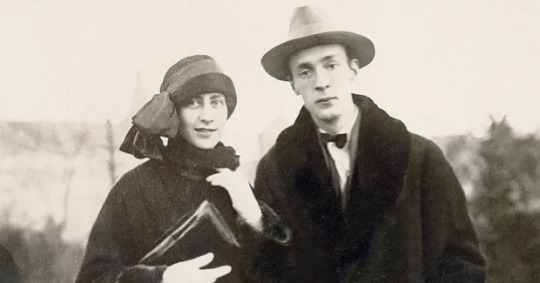
"My tenderness, my happiness, what words can I write for you? How strange that although my life’s work is moving a pen over paper, I don’t know how to tell you how I love, how I desire you. Such agitation — and such divine peace: melting clouds immersed in sunshine — mounds of happiness. And I am floating with you, in you, aflame and melting — and a whole life with you is like the movement of clouds, their airy, quiet falls, their lightness and smoothness, and the heavenly variety of outline and tint — my inexplicable love. I cannot express these cirrus-cumulus sensations."
- Vladimir Nabokov's love letter to his wife, Véra ❤️
#writing#literature#writers and poets#love#authors#vladimir#vladimir nabokov#nabokov#véra#véra nabokova#véra slonin#russia#russian poetry#russian literature#russian author#love letters#letters#love quote#couple#ussr (former soviet union)#ussr#ussr literature#their love was so pure and tender#one of the best love letters to be ever written#thoughts#books and reading#booksbooksbooks#bookblr#book quotes#booklr
66 notes
·
View notes
Text
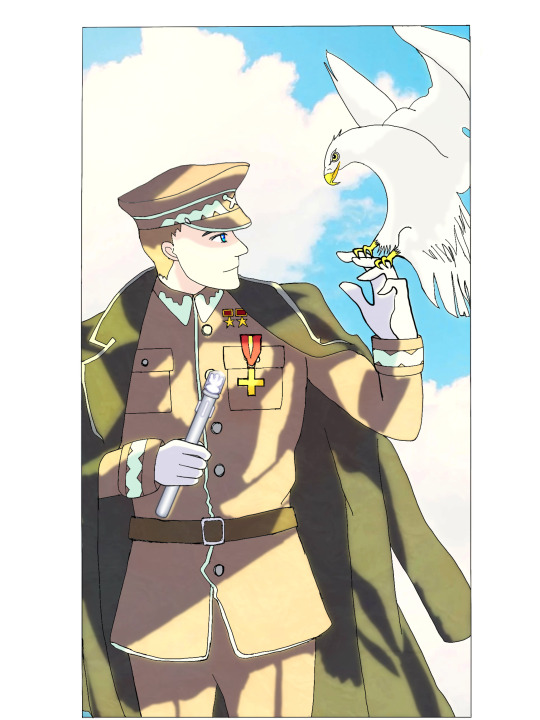
Rokossovsky, Marshal of the Soviet Union and Poland, one of the most famous commanders of World War II. He holds the marshal's scepter in his right hand, and the Polish white eagle rests on his left hand.
#rokossovsky#ww2#history#art#poland#soviet union#ussr (former soviet union)#military#1940s#rokossowski#rokossovski#russia#russian history
43 notes
·
View notes
Text
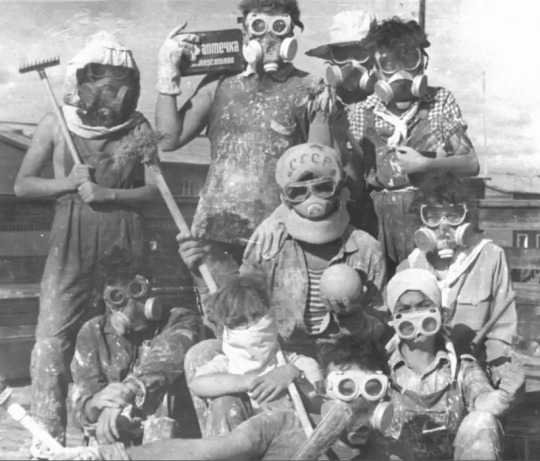
Moscow Students at the work camp 1988
48 notes
·
View notes
Text
was talking to @xenowlsome about 19th century novels we were into as kids and she was like “oh i really loved the headless horseman but i can’t remember the author” and i said “i’m struggling but it’s on the tip of my tongue. all i can think of is ichabod crane but that’s the character” and she goes “oh that’s not the headless horseman that’s a different story. i’m talking about the headless horseman. you know. it’s set in texas.” MA’AM THE WHAT? i’m pretty sure sleepy hollow is not in texas!!!
anyway that’s how we discovered that this story is in fact called the headless horseman, set in texas, and apparently wildly popular in the former soviet union due to being the inspiration for a 1972 soviet western film.
another hit in the “often obscure 19th century european or american novels that are disproportionately wildly popular in the former soviet union” canon
#ivanhoe is very niche in modern day english speaking countries but was really popular in the soviet union#and the other one i can think of is the three musketeers which is def not the same level of obscurity here but super popular in former ussr
20 notes
·
View notes
Text

New here…?
#countryhumans#countryhumans russia#countryhumans ussr#Countryhumans russian empire#ussr art#ussr (former soviet union)#russian empire#russia#artists on tumblr#fan art
30 notes
·
View notes
Text

#chisinau#trip#roadtrip#eastern europe#moldova#buildings#architecture#brutalist#colors#city architecture#city aesthetic#concrete#modern architecture#modernism#brutalist architecture#soviet architecture#ex ussr#ussr (former soviet union)#ussr architecture#capital city#mine#photo#urban photography#my photo#europe
17 notes
·
View notes
Text

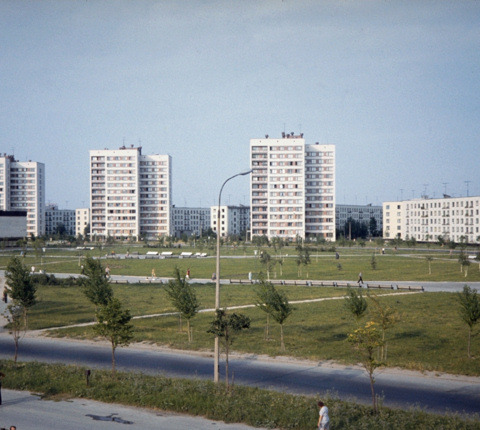
i attempted drawing communal housing from the ussr in the late 70s/ early 80s (used a photo for one building)!
6 notes
·
View notes
Text
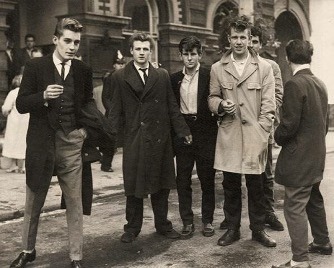
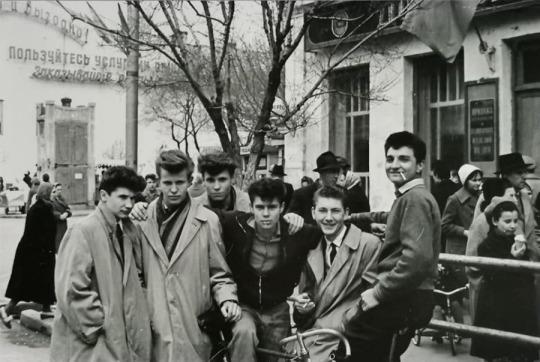

Soviet “Stilyagi” style hunters, hipster of their day
#art#cinema#vintage#films#retro aesthetic#artwork#film#retrowave#1960s films#1970s films#soviet#ussr (former soviet union)#1960s fashion#1960s style
7 notes
·
View notes
Text
The first video of the Chernobyl plant after the accident. The red glow inside the reactor building is the red hot graphite inside the core of the reactor.
To learn more, check out this post.
#chernobyl#radiation#accidents and disasters#history#disaster#chernobyl hbo#reactor#nuclear reactor#nuclear disaster#helicopter#autism#aerial footage#nuclear#pilot#nuclear power#fire#soviet union#ussr (former soviet union)#ussr#ussr history#disaster footage#soviet#chernobyl disaster#chnpp#explosion#dangerous#actual footage
165 notes
·
View notes
Text
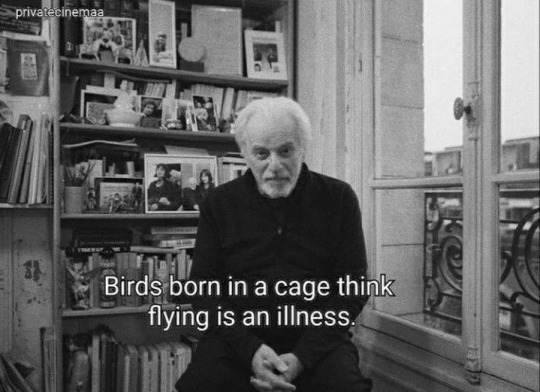
I always use this quote when I'm having a discussion with older people about the difference between the generations... great amount of people who criticize newer generation in my country were born in the USSR... of course, they will never know what it's like to be really free and not be afraid of saying what's on your mind, to defend yourself, your beliefs and morals (except only the little amount of them, who fought for the independence we have today) ... they were born in the iron cage, therefore, flying will always be an illness for them, we who were born out of that cage will forever be strangers and sick for them, no matter how much we try, no matter what we do...
Also, I could have drawn a really good parallel to this quote from the bible, but I'm kinda tired for that...
#thoughts#writing#literature#writers and poets#authors#film#slavery#generations#war between generations#new times#ussr (former soviet union)#ussr#independance#freedom#cage#black and white#quotation#movie quotes#quotes#good metaphors
44 notes
·
View notes
Text
My take on the Soviet Union: by the standards of which a bourgeois revolution might be judged, it was successful. It destroyed the old reactionary autocracy and, on average, improved the standard of living for its people (while also repressing them). However, as a Marxist or a socialist revolution, it was an utter failure, except insofar as it prevented capitalism from being seen as the only option in world politics while it existed. No liberatory system was enacted. Instead, the means of production were given not to the workers but to a class of barely accountable bureaucrats. The USSR established a disciplinary society with Fordist alienation of labor and a prison system and forced institutionalization system that was heavily weaponized against those that couldn't be properly disciplined. And, for all this, the USSR never came close to achieving communism - instead, its bureaucratic state apparatus ossified and stagnated until both internal and external pressure shattered it and ruthless gangster capitalism came to take its place.
#soviet union#libertarian socialism#state socialism#disciplinary society#alienation of labor#fordism#marxism#im not from the former ussr so i dont have firsthand experience obviously#im sure anticommunists would say this take isn't harsh enough and state socialists would say this take is too harsh
2 notes
·
View notes
Text
Soviet union films that you should check out
Viy (Вий) (1967)
The film was directed by ukranian directors Konstantin Yerchov and Georgi Kropachyov in 1967. The film is an adaptation of Nikolai Gogol's short story Viy, published in 1835. The story is about an encounter between three young men freshly out of the seminary in Kiev and a witch, to whom they take shelter after wandering off into the plain. The witch sets her sights on one of them, Thomas, who is not fooled and tries to catch her at her own game. In revenge, she pretends to be dead, and Thomas is forced to watch over her body in a chapel for three days. After what, Thomas’ soul is promised to heaven. But things don't go according to plan, and the corpse comes back to life at night, to torment the young clerk.

Gogol's story is rooted in the rich folklore of Ukraine, but from the outset it is an anti-clerical manifesto. This vein can be felt in the film adaptation, which sticks very closely to the text. Indeed, anti-clericalism was one of the main spearheads of the Soviet regime, which meant that the adaptation project was widely welcomed by the authorities. What is interesting, however, is that the film delves into Ukrainian cultural history and gives a fantastic portrait of medieval Ukraine. One can see this especially in the duel between Christianity and older local beliefs, and particularly through the character of the witch as she invokes the demon Viy, king of the gnomes, as Thomas is trying to perform exorcism on her.
The film is on the side of horror, but paradoxically it is less through the evocation of monsters than through the character of the witch herself. The power of Natalya Varley's gaze is heightened by the stillness of the shots and the silence, building up the film's horrific tension. The ambivalence of this character, who oscillates between looking like a young girl and an old woman, tends to deconstruct the vulnerability of female characters in cinema. It is she who triumphs in the story, simply by virtue of her powers, which enable her to destroy the man who was standing up to her. In relation to the context of the film's production, this character is truly unsettling just as magnetic.

The character of the young clerk is also very interesting. Far from being a hero, he has many flaws, including alcoholism and cowardice. The use of diy special effects with proto-green screen attempts to make the character's flaws more palpable on screen. He is very much inspired by the characters of Gothic novels, and his destiny only confirms this.
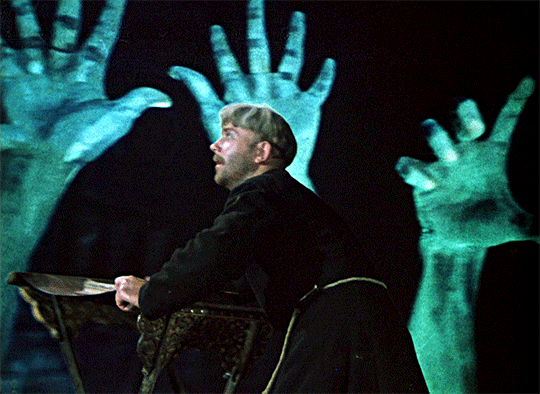
As for the figure of the devil Viy, it encapsulates both the power of folklore and the fatality that mows down in its path all individuals who do harm to society. It is Thomas's greedy and selfish quest for salvation that causes his downfall. Beyond these considerations, the staging of the demonic saraband is remarkable. Many of the special effects, such as the green screens mentioned above, and the analogue processes used in the sets and costumes are brilliantly executed. And in a way, they set the standard for the representation of monsters in cinema, since relatively similar processes will be found in other films later on, such as Peter Jackson's Lord of the Rings saga (2001-2003).

Link to watch the film : https://youtu.be/4YmQn6q36HQ
J.A Lenourichel
6 notes
·
View notes
Text
Anyone who loves freedom owes such a debt to the Red Army that it can never be repaid
2 notes
·
View notes
Text
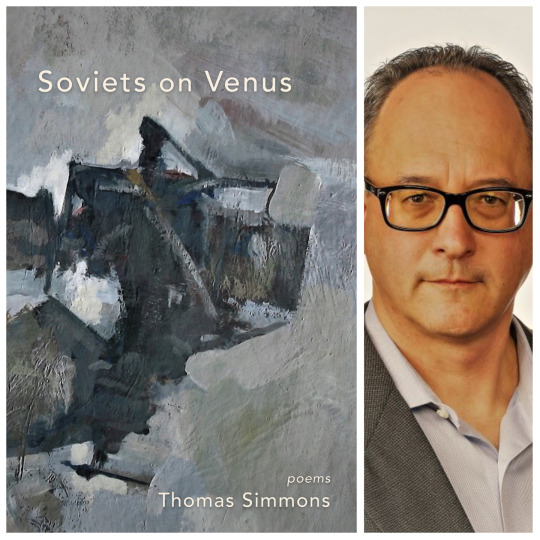
NEW FROM FINISHING LINE PRESS: Soviets on Venus by Thomas Simmons
ADVANCE ORDER: https://www.finishinglinepress.com/product/soviets-on-venus-by-thomas-simmons/
#Soviets on #Venus explores a remote jeweled casket. It construes an alien neighbor as it reconceptualizes an underrated scientific breakthrough: the series of unnamed probes piloted to #Venus by the #USSR between 1961 and the mid-80’s. The missions were called the Venera program. These fantastical spacecraft transmitted data, vivid photographs, and poetic energy back to Earth. Some piloted through the morning star’s magma-hot, swampy atmosphere as balloons. A few smashed themselves into aeolian canyons or upon alien tufa. A handful simply melted away into silvery pools. And several ended in disaster. These fantastic probes form a sediment of verse from which a strange beauty emerges.
PRAISE FOR Soviets on Venus by Thomas Simmons
Only the dexterity of a poet like Simmons could illuminate the tragic furrows where the trauma of socialist politics overtakes legitimate scientific inquiry. There is a revelation here, and a quiet restlessness.
—Gregory Kipp, Geological Engineer
Weaving thoughts and images and historical facts together in a poetry which maintains a sparse lyricism, Simmons’ narrative is not only vastly more entertaining than most prose histories, but it gives the reader a unique advantage to imagine and reimagine the story that is being told.
–Cliff Cunningham, Research Fellow, University of Southern Queensland and author of Asteroids
Is the verse collection Soviets on Venus good or bad? Yes. Find out for yourself!
–Frank Pommersheim, Professor Emeritus, Knudson School of Law and author of Braid of Feathers
Please share/repost #flpauthor #preorder #AwesomeCoverArt #read #poems #literature #poetry #USSR #venus #space
#poetry#preorder#flp authors#flp#poets on tumblr#finishing line press#small press#book cover#books#publishers#poets#poem#smallpress#poems#venus#space science#ussr (former soviet union)
3 notes
·
View notes
Link
By Ilya Kaminsky
[Mr. Kaminsky is a Ukrainian American poet and the author of “Dancing in Odessa” and “Deaf Republic.”]
Two weeks into the war, the Russians are still menacing my birth city, Odessa, in southwestern Ukraine. It sits on high bluffs above the Black Sea, its famous steps leading from the water to a square.
I don’t want to imagine soldiers chasing civilians through my city. Some part of my brain turns it into a farce, based on something I remember from my own childhood: In 1984, in a village just outside Odessa, I’m a 7-year-old deaf boy running in the government’s corn field. Behind me, waving his arms, runs a policeman. My grandmother, in her 60s, sprints in front of me.
We are stealing corn from the government, my grandmother and I. We get away, and we don’t stop at corn. A different day, Grandmother hauls me up onto the roof of the state farm so my long arms can reach into the branches of the plum trees. Her lips say, “Pick only the ripest.” She makes jam. Years later, I read the Russian poet Inna Kabysh: “Whoever is making a jam in Russia / knows there is no way out.”
Now I spend most of every day online, in America, trying to find ways out for Ukrainian poets and translators. Many literary organizations are willing to open their doors, bring in refugees, but unlike my grandmother and me, lots of Ukrainians writers don’t want to leave. They want their freedoms. They want their own languages — Ukrainian and Russian — in their own streets. I understand. My Jewish family keeps running from Odessa — and then returning.
Since the war began, I have received emails from journalists asking me to explain my poem “We Lived Happily During the War,” which went viral on the day Vladimir Putin’s troops began bombing my birth country. The poem was published on Poetry International in 2013, the same year the Maidan protests began in Ukraine. Viktor Yanukovych, Ukraine’s president at the time, was trying to lean closer to Putin and crush protests. Ukrainians rejected him; Putin stole Crimea; and the war in Donbas began.
“We lived happily during the war,” the poem begins, “and when they bombed other people’s houses, we / protested / but not enough, we opposed them but not / enough.” As I was writing the poem, my adopted country, the United States, was in the middle of its own “freedom” campaigns.
How are Putin’s bombardments of Kyiv different from George W. Bush’s bombardments of Baghdad? Both invasions used false premises: imaginary weapons of mass destruction in Bush’s case, and imaginary protection of the Russian language, among other justifications, in Putin’s. Odessa is a largely Russian-speaking city and Putin is sending troops to bombard Russian speakers — that is how he “protects” the Russian language.
“I woke up because of explosions,” my cousin Petya emailed me recently. “They were bombing the beach. Who do they think they’ll hit? This isn’t vacation season!” His jokes are typical of Odessa, a city of good humor, where April 1 is one of the most important holidays.
When I think of Russian troops arriving at the bay, I imagine them in their heavy gear, trying to huff and puff up the stairs, while Ukrainians throw Molotov cocktails and stones. My grandfathers fought the German tanks on tractors. This war feels like something out of a movie or a poem — but it is real. The city trembles.
“And when they bombed other people’s houses,” the poem goes. Who remembers the blitz of Grozny, Chechnya’s capital city, now? American politicians shouted for a bit. Then they forgot. It is lucrative to forget. The oil companies like doing business with Putin. “In the street of money in the city of money in the country of money,” the poem says, “our great country of money.”
And yet on the first day of March, over 800 people gathered for a Zoom poetry reading bringing together Ukrainian and American poets. It was one of the largest poetry readings I have witnessed. Why did so many turn to poetry in this time of crisis?
While we read poems, the 40-mile Russian military convoy threatened north of Kyiv. The West watched as young civilians took up guns, sand bags, Molotov cocktails. It’s not an especially large country, only 44 million people. There’s no one to fight for us but us.
“The West is watching us,” a friend writes. “This is their reality TV war, they are curious to see whether we will go on living, or die.”
Another friend emails: “We saw fighter aircraft, helicopters and Russian paratroopers from our window. But we walked for miles.” He tells me that they’re safe now: His wife is in Poland and he’s in Ukraine. He sends photos of the city where they lived.
A different day, a friend from Kyiv writes: “Am in Bukovina, took 2 dogs and 1 cat with me, Sophie’s choice, left 3 cats behind, being cared for by a neighbor.” It’s unbearable, she tells me. She is 12 miles from the Romanian border. Eventually, she crosses with only one dog.
An Odessa friend contacts me to say: “I’ve seen today 10-km queue in Palanca and approx 500-600 people that were walking by feet. Mamas with kids and it’s snowing and some kids crying, others have serious men’s eyes.”
Another friend, who remains in Odessa, tell me he just got back from the store: “People are grabbing any food they can find. I’m trying to do art. Read out loud. To distract myself. Try to read between the lines.”
I ask how I can help. Finally, an older friend, a lifelong journalist, writes back: “Putins come and go. If you want to help, send us some poems and essays. We are putting together a literary magazine.”
In the middle of war, he is asking for poems.
Ilya Kaminsky (@ilya_poet) is the author of “Dancing in Odessa” and “Deaf Republic.” Born in the Soviet Union, he lives in Atlanta, where he teaches at Georgia Tech.
14 notes
·
View notes